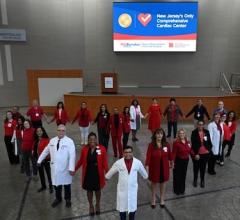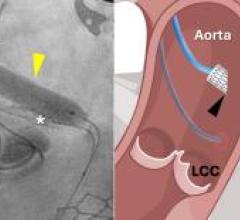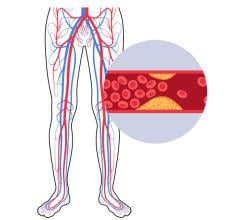August 19, 2008 – St. Jude Medical Inc. said today it received European CE Mark approval and FDA clearance for the Epicor LP Cardiac Ablation System, a second generation technology that uses HIFU (high intensity focused ultrasound) to surgically ablate cardiac tissue to disrupt abnormal electrical impulses in the heart.
The first patient to undergo treatment with the Epicor LP System was a 73-year-old male with coronary artery disease and atrial fibrillation (AF). The procedure was performed by Malcom Dalrymple-Hay, FRCS Ph.D. FECTS, a cardiac surgeon at Derriford Hospital in Plymouth, U.K. The patient, who has suffered from persistent AF for more than three years, had a normal heart rhythm upon completion of the ablation procedure.
“An increasing volume of published literature is demonstrating the benefits of treating pre-existing AF in patients who are undergoing valvular or coronary artery bypass surgery,” said Dr. Dalrymple-Hay. “The Epicor LP System provides me with a technology that is flexible enough to treat AF patients during either standard open chest procedures or minimally invasive surgical procedures.”
AF is the most common abnormal heart rhythm condition, affecting millions of patients worldwide. With AF, the heart’s upper chambers (the atria) do not beat effectively due to abnormal electrical activity. As a result, the heart cannot effectively pump blood, which can lead to shortness of breath, heart palpitations and fatigue. If left untreated, AF increases the risk of stroke five fold, according to a study reported in the journal Stroke (Wolf et al, Atrial Fibrillation as an Independent Risk Factor for Stroke: the Framingham Study, 1991). AF is progressive and increases in frequency and severity as patients grow older, and surgical cardiac ablation has been found to provide relief from AF for a high percentage of patients.
In surgical ablation performed with a HIFU energy source, energy is focused from outside a beating heart. This treatment has been designed to create precise and complete lines of cardiac tissue ablation to block chaotic electrical impulses. The patient does not need to be placed on a heart-lung bypass machine nor is the heart stopped. Because HIFU energy is directed from outside the heart inward (instead of from the inside out as is sometimes the case in ablations performed with other energy sources), the risk of unintended peripheral damage is minimized, the company said.
In contrast, the traditional surgical approach requires that patients be placed on a heart-lung bypass machine with their hearts stopped while a cardiac surgeon cuts maze-like patterns in the atrial tissues and then sews the incisions to encourage the formation of lesions, or tiny scars. Surgeons may also use alternative energy sources, such as radiofrequency or cryothermy, to create lesions in heart tissue. The lesions disrupt the abnormal electrical impulses that cause AF.
The Epicor LP system is smaller relative to the first generation technology and is designed to facilitate easier device introduction and placement around and on patients’ hearts, the company said. In addition, the Epicor LP System is equally suited for use in both closed-chest procedures performed through a single incision, and in open-chest procedures.
The first generation Epicor System gained regulatory approval for the treatment of AF in Europe in 2006. In the U.S., the first generation Epicor System and the Epicor LP System received clearance from the FDA for the surgical ablation of cardiac tissue but has not been indicated by the FDA specifically for the treatment of AF.
For more information: www.sjm.com


 February 06, 2026
February 06, 2026 









